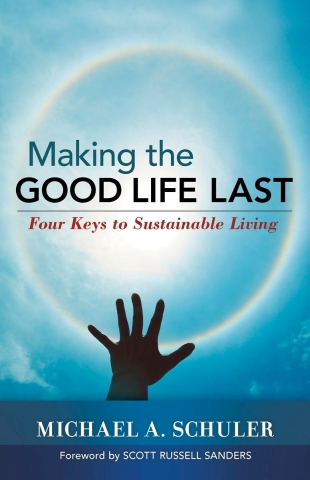The Rev. Dr. Michael A. Schuler serves as the parish minister of the First Unitarian Society of Madison, Wisconsin. He believes that sustainability is a process that not only refers to keeping the environment healthy and safe but also includes supporting and nourishing the economy, community, and family systems. Schuler has come up with four keys to sustainable living which he explores at length in this book:
1. Pay Attention
2. Stay Put
3. Exercise Patience
4. Practice Prudence
One of the ways to really pay attention is to be what novelist Wallace Stegner once called "a sticker" — making a deep and abiding commitment to the place and community where you live. He quotes the comedian Steven Wright's remark that "God is going to come down and pull civilization over for speeding." The practices of patience and being present help us slow down and appreciate the wonders and miracles that surround us. The challenge of being prudent — exercising caution and foresight — is crucial to sustainable living. What we do now has a major impact on those who are due to take over from us.
Despite these positive values, Schuler outlines elements of conventional Christian thought that mitigate against sustainability. Capitalism and technology also are powerful impediments to the development of a sustainable culture and lifestyle. An alternate voice is that of theologian Sallie McFague who has written: "A just and sustainable planet is the great work of the twenty-first century to which all religions . . . are called."
In the last section of Making the Good Life Last, Schuler spells out ways in which the four keys can enrich and enhance our bodies, our work experiences, our relationships, our communities, our careers, and our eating habits. He concludes:
"A sustainable future is conceivable and more probable if we can manage to instill in people a deeper sense of gratitude. In the final analysis, sustainability is as much a spiritual as a practical matter because it requires both a thorough reorientation of our relationship to the world and a radical revision of certain assumptions we have made about good and meaningful living."
